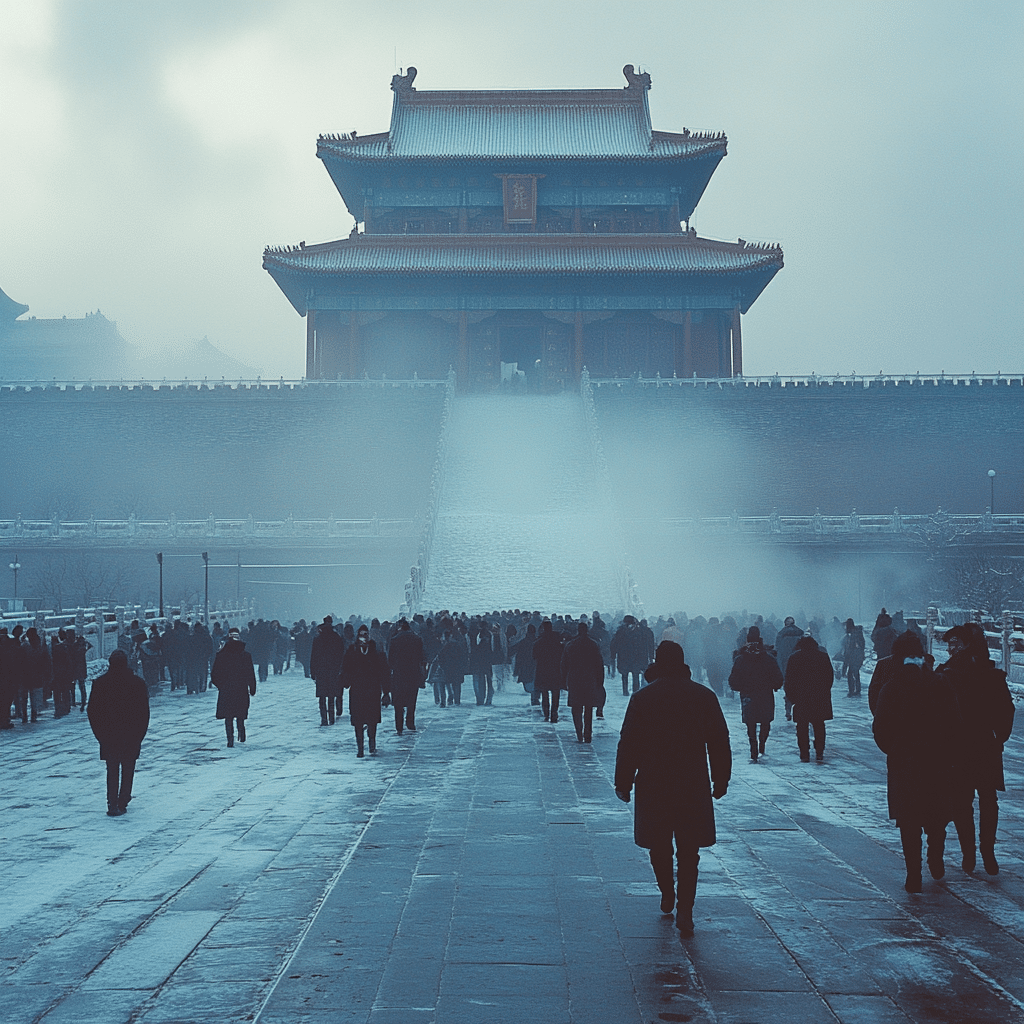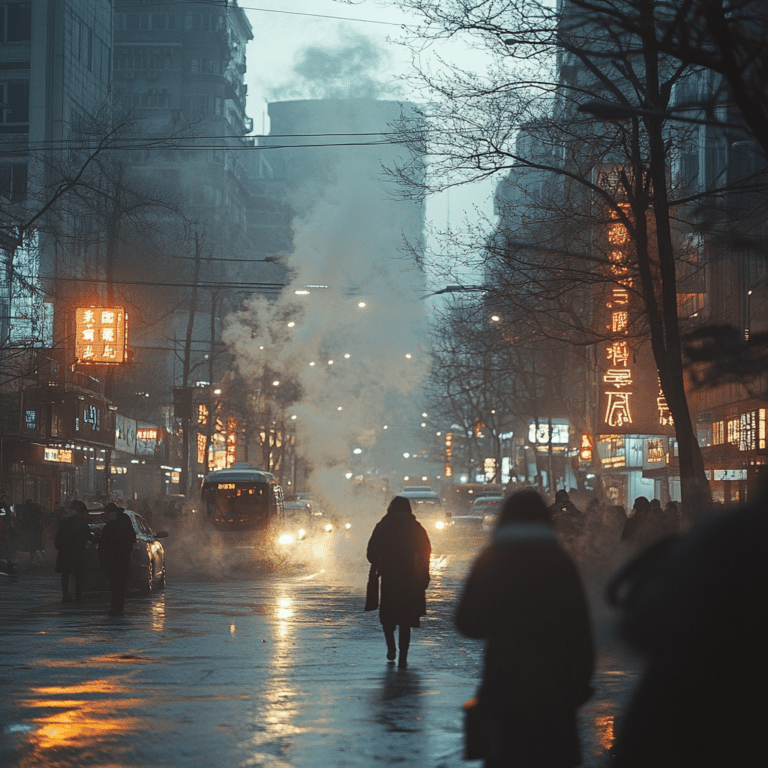The Science Behind Boiling Beijing’s Record Temperatures
The summer of 2024 has brought Beijing unprecedented heat waves, turning the city into what locals and scientists alike are terming “Boiling Beijing.” This phenomenon isn’t just a casual moment of discomfort; it has deeper scientific underpinnings that warrant closer scrutiny.
Climatic Shifts and Global Warming
Numerous climatologists point to global warming as a significant contributor to these intense heat waves. According to a report from the Beijing Meteorological Bureau, the city’s average temperature has risen by 2 degrees Celsius over the past decade. Dr. Zhang Wei, a leading climatologist at Tsinghua University, explains that this increase exacerbates the urban heat island effect, where dense urban structures retain heat, pushing temperatures even higher.
The Impact of Pollution
Another layer to this climatic conundrum is air pollution. Beijing has long struggled with smog and particulate matter, which trap heat in the atmosphere. Research by Greenpeace East Asia shows that particulate matter (PM2.5) levels have escalated this summer, creating a blanket that prevents heat from escaping, thus intensifying the ‘boiling’ effect.

Impact on Daily Life and Infrastructure
Beyond numbers and scientific terminology, the effects of Boiling Beijing extend deeply into the lives of its residents and the city’s infrastructure.
Public Health Concerns
The Beijing Municipal Health Commission has reported a 30% increase in heat stroke cases compared to previous years. Dr. Liu Ming, an emergency room physician at Peking Union Medical College Hospital, emphasizes that vulnerable populations—like the elderly and children—are at particularly high risk. Increased hospital admissions for respiratory conditions underscore the compounding effect of high heat and pollution levels.
Strain on Utilities
Electricity consumption has skyrocketed as residents and businesses clamor to cool down their environments. The State Grid Beijing Electric Power Company notes that this July saw a record high in electricity usage, pushing the city close to rolling blackouts. To manage this, the municipal government has introduced measures to reduce electricity consumption during peak hours, targeting large commercial consumers first.

| Aspect | Details |
| Climate Change Impact | Beijing has experienced increasing temperatures over the past decades, with urban heat islands exacerbating the conditions. |
| Air Quality Index (AQI) | Often exceeds safe levels, especially during winter months due to coal burning for heating. Average AQI can range from 100 (Moderate) to over 300 (Hazardous) during peak periods. |
| Pollution Sources | Major sources include vehicle emissions, industrial output, and coal combustion. |
| Government Initiatives | Implementation of the “Blue Sky” action plan, promotion of electric vehicles, and closure of heavy polluting factories. |
| Green Spaces | Increase in urban green spaces and rooftop gardens to combat heat effects, includes projects like the Yongding River Greenway. |
| Water Scarcity | Due to over-extraction and pollution, Beijing faces water scarcity, impacting both residents and agriculture. |
| Renewable Energy | Investment in solar and wind energy to reduce reliance on coal, aiming to increase the proportion of renewables in the energy mix. |
| Public Awareness | Campaigns to reduce personal carbon footprints and enhance community involvement in sustainability practices. |
| Economic Impact | High pollution levels can affect tourism, public health, and economic productivity; government expenditure on health-related issues is significant. |
| Future Predictions | Climate models suggest more extreme weather conditions if global warming trends continue, with potential impacts on urban living conditions and public health. |
The Economic Repercussions of Boiling Beijing
These extraordinary conditions are not just a public health issue, but also an economic one, affecting various sectors across the city.
Agricultural Impact
Beijing’s outskirts and neighboring Hebei Province serve as vital agricultural zones supplying the city. The heat has led to drought conditions, severely impacting crop yields. According to the Ministry of Agriculture and Rural Affairs, some areas report up to a 50% decline in output for staple crops like wheat and corn. This has escalated food prices, causing concern among city residents.
Tourism and Events
2024 was set to be a landmark year for Beijing’s tourism as the city planned to host several international events, including parts of the Summer Youth Olympic Games. However, the incessant heat has deterred tourists. Liu Fei, a tour operator with Beijing Express Travel, notes a 25% decline in bookings this summer, correlating with rising temperatures. Many outdoor events have been either canceled or moved indoors, leading to logistical challenges and financial losses.

Innovative Solutions to Combat Boiling Beijing
While the challenges posed by Boiling Beijing are formidable, they have also spurred innovative solutions from both the government and private sectors.
Green Initiatives
The Beijing Municipal Government is investing heavily in green infrastructure to combat urban heat. This includes expanding green roofs, enhancing urban tree cover, and developing public green spaces. A collaboration with Tesla has seen the introduction of solar-powered cooling stations across the city, providing respite for pedestrians. Moreover, efforts are being made similar to those in Jaelyn Duncan’s inspiring story in promoting eco-friendly practices.
Technological Advancements
Smart technology is also playing a crucial role. Alibaba has launched an AI-based heat prediction service that offers real-time data and alerts to help residents plan their activities. Similarly, Beijing’s local start-up, Coolify, has developed wearable cooling devices that have gained popularity, especially among outdoor workers.

How Boiling Beijing is Shaping the Future
Boiling Beijing is not just a temporary crisis but a wake-up call for long-term urban planning and climate resilience strategies.
Urban Resilience Planning
Urban planners are revisiting Beijing’s long-term development strategies to include climate adaptation in every aspect—from housing to transportation. A large-scale project funded by the Asian Infrastructure Investment Bank (AIIB) aims to retrofit old buildings with energy-efficient cooling systems, mirroring extensive projects found in Khan Younis, Gaza.
Policy and Education
Finally, there’s a growing recognition of the need for robust public education campaigns. Schools and workplaces are incorporating environmental awareness programs to foster a culture of sustainability, much like Brenda Tracy’s activism in raising awareness on various social issues.

In sum, Boiling Beijing offers both a cautionary tale and a call to action, compelling policymakers, scientists, and citizens to innovate and collaborate towards a more resilient and cooler future. The heat waves of 2024 may be a harbinger of more challenging times to come, but they also underscore the urgency and potential for meaningful change. Boiling Beijing forces us to reconsider our urban practices and develop creative, sustainable solutions for an increasingly heated world.
Boiling Beijing Astounds With Record Heat
Unbelievable Extremes
Boy, it’s hot! Beijing’s recent temperature spike has left many gasping for air, with thermometers soaring to unprecedented heights. Interestingly, as the city swelters under this incredible heatwave, some might find it a bit of an irony. How, you ask? Just miles away, black bears in DC roam with absolutely no concern for the rising temperatures, staying cool and unbothered by the relentless Beijing sun.
Transitions like these often remind us of how the planet’s weather can be so unpredictable. In another twist, residents coping with the heat might look for ways to invest in cooling their homes. Planning financially can be a relief; thus, knowing how to utilize a home loan calculator in the USA might be a wise step for those pondering new air conditioner units or improved cooling systems.
Clashing Weather Patterns
Considering Beijing’s record temps, it’s fascinating to see the bizarre weather tales from around the world. From the sweltering heat in Beijing to the stark turmoil seen in Khan Younis, Gaza, weather patterns around the globe show striking contrasts. It’s incredible how our planet can display vast differences in climate and conditions, but it’s these very differences that build our understanding and empathy for places undergoing significant challenges.
This idea of global diversity extends beyond weather. For instance, take Brenda Tracy, an activist making waves not just in single locales but across the nation, advocating for change and resilience. These variances in focus illustrate a world teeming with unique stories and circumstances, all intertwined in one way or another.
Relatable Pop Culture Connections
Bringing it back to relatable tales, fans of The Good wife Season 7 might reminisce about navigating through unprecedented twists just like Beijing’s surreal weather. The unpredictability of both a TV season and weather days is something we all grapple with. As temperatures in Beijing skyrocket, many people might also find solace in more serene distractions, like sharing some uplifting blessed Friday Images with friends and family online.
Finally, it’s always amazing to see how, amid such soaring temperatures, life and stories continue to unfold in various forms. Take the Idaho case, for instance, something that continually grabs headlines and reminds us that even under intense conditions, human narratives persist robustly. So, here’s to Boiling Beijing – a testament to nature’s might and our shared stories, whether hot or cold.




























